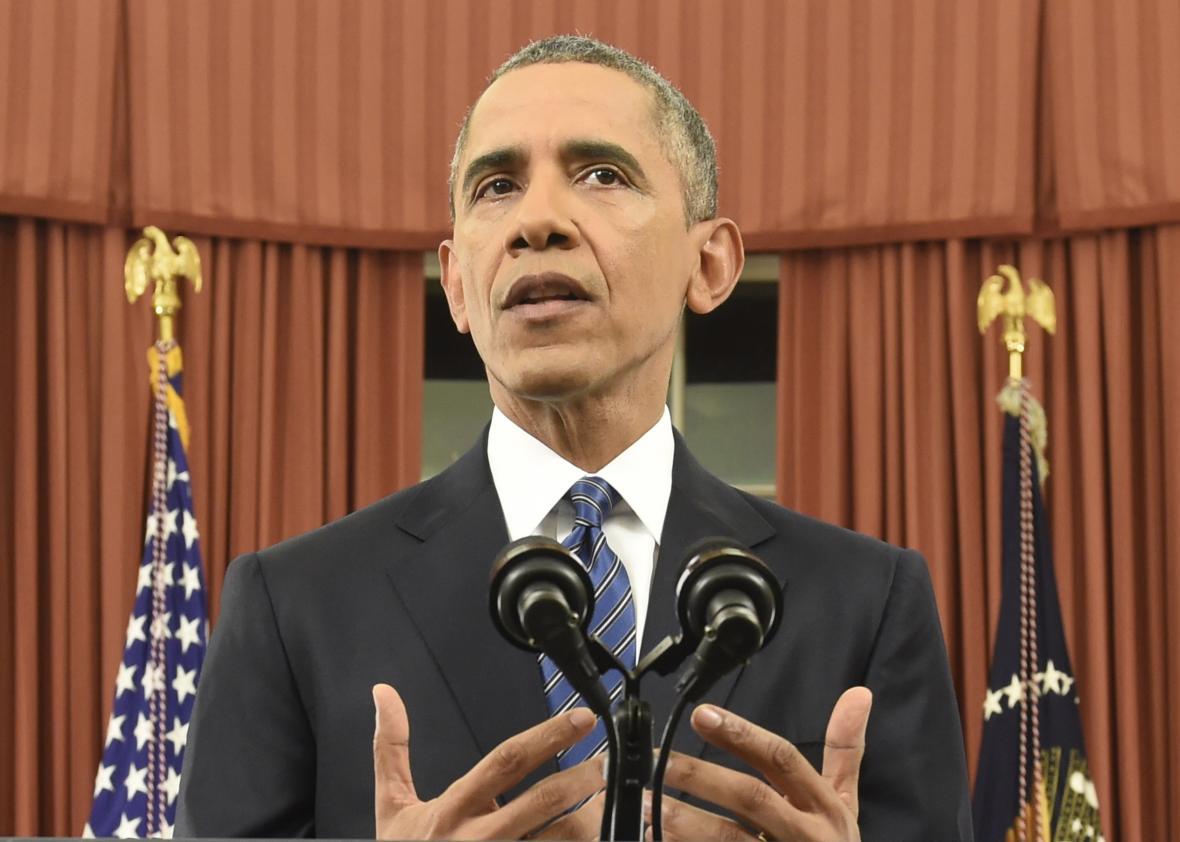The question, after President Obama’s prime-time televised speech Sunday night, is whether common sense and an awareness of limits still have a place in American politics.
He has delivered similar speeches before, though this one was more forceful in tone and more specific in language, laying out the elements of what to do, and not do, in a bullet format. (First … Second … Third …) His critics had failed to voice any substantive alternatives to his previous proposals. When a moderator would ask what the critics would do differently, they had no answer, except for some who thought that repeating the words “radical Islam” while dropping smart bombs would somehow make the war go faster.
Obama listed the things that he and other world leaders have done, and stepped up doing since the attacks in Paris. At home, law enforcement and intelligence have thwarted countless plots. Abroad, the military has mounted airstrikes, trained and equipped Syrians and Iraqis fighting ISIS on the ground, sent special-operations forces to accelerate those efforts, and surged intelligence-sharing, while diplomats are trying to negotiate a political cease-fire in Syria, so that the “coalition” of countries—including Russia, he intriguingly noted—can pursue their common interest of defeating ISIS. (The White House also put out a fact sheet, cataloguing these activities in somewhat greater detail.)
He proposed a few things Congress could do: pass a law forbidding anyone on a terrorist watch list from buying semi-automatic weapons (the fact that Senate Republicans voted down such a bill is staggering); step up screenings for those who come to the United States (that should be popular); and pass a bill authorizing the president to use military force against ISIS (congressional Republicans’ persistent refusal to do so reflects an unwillingness to share any responsibility for the war that they keep pushing Obama to wage more fiercely).
Finally, he listed a few things the country should not do: send thousands of U.S. troops to a “long, costly ground war in Iraq or Syria” (which would only spur pro-ISIS recruitment) and define the war as “America vs. Islam” (which would also play into ISIS propaganda, as well as alienate more than 1 billion Muslims worldwide while defaming millions of “patriotic Muslim Americans.”) Yet, at the same time that he urged all Americans to “reject discrimination,” he also called on Muslim Americans to “confront” their responsibility for defeating the radical ideology infecting their communities, “without excuse.”
Will any of these remarks assuage widespread fears about terrorist attacks in the holiday season and beyond? Probably not. What could he or anyone else have said that might have had that effect? I don’t know, and neither does anyone else.
After Sunday night’s speech, Donald Trump, the Republican front-runner, tweeted, “Is that all there is? We need a new President—FAST!” As for what Trump would do if he were the new president, his follow-up tweets supplied no clue: “Wish Obama would say ISIS, like almost everyone else, rather than ISIL.” And: “He needs to stop all Visas, not look at them.” The former is silly grumbling, the latter impractical nonsense.
In the past, Trump has also said he would “bomb the shit” out of ISIS. Sen. Ted Cruz one-upped him this weekend, telling a crowd, “We will carpet-bomb them into oblivion,” adding, “I don’t know if sand can glow in the dark, but we’re going to find out.” Do these candidates know what they’re saying? Is Cruz really threatening to drop nuclear bombs in the Syrian desert? It’s not as if ISIS is camped outside towns, away from populated cities, and it’s not as if the residents of those cities are all members of ISIS or at war with us. By comparison, Sen. Lindsey Graham, who advocates sending 20,000 American ground troops to Iraq and Syria (a position that almost no one supports, including Trump, Cruz, or anything close to a majority of congressional Republicans), seems moderate.
Obama doesn’t have dramatic answers. The last few lines of his speech—“We are on the right side of history” and “Freedom is more powerful than fear”—are cliché. Hegel and Marx notwithstanding, history has no juggernaut momentum; it has no right or wrong side. And while freedom is certainly nobler than fear, there have been many moments in history when fear has been a more powerful impulse.
But no one else, least of all the likes of Trump, Cruz, and Graham, has any dramatic answers either. Obama has laid out a road. Critics who have never been dealt hard questions on the subject soon reveal that their road doesn’t look very different. Some have called the war against groups like ISIS a “long war.” There are no magic bullets or buzzwords.
